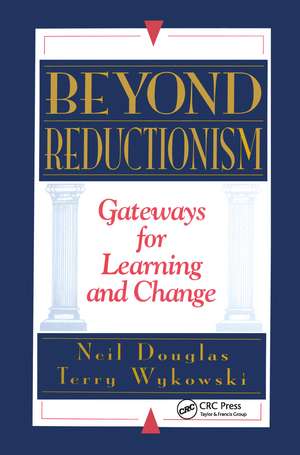Beyond Reductionism: Gateways for Learning and Change
Autor Neil Douglas, Terry Wykowskien Limba Engleză Hardback – 18 mai 1999
Often seen as the central constraint - and the core limiting factor in organizational effectiveness and learning - reductionism is defined as over-simplification and a failure to comprehend the nature of life in organizations by concentrating too fully on discrete and disconnected aspects of reality. The other constraints of hierarchy and institutional knowledge are activated and driven by reductionism.
After reading Beyond Reductionism: Gateways for Learning and Change leaders at all organizational levels will understand why low levels of organizational learning persists and change efforts fail. They will also be equipped to recognize and reject overly simplistic and superficial interventions, helping them to create non-reductionist strategies for creating and sustaining change. Actual project designs, experiences, techniques and results are described in the book within an overall framework that emphasizes the roles and interconnectedness of individuals, leaders, and groups, all operating within the overlay of culture.
Preț: 570.73 lei
Preț vechi: 764.42 lei
-25% Nou
Puncte Express: 856
Preț estimativ în valută:
109.21€ • 114.33$ • 90.36£
109.21€ • 114.33$ • 90.36£
Comandă specială
Livrare economică 17-31 martie
Doresc să fiu notificat când acest titlu va fi disponibil:
Se trimite...
Preluare comenzi: 021 569.72.76
Specificații
ISBN-13: 9781574442632
ISBN-10: 1574442635
Pagini: 266
Dimensiuni: 152 x 229 x 20 mm
Greutate: 0.53 kg
Ediția:New.
Editura: Taylor & Francis
Colecția CRC Press
Locul publicării:Oxford, United Kingdom
ISBN-10: 1574442635
Pagini: 266
Dimensiuni: 152 x 229 x 20 mm
Greutate: 0.53 kg
Ediția:New.
Editura: Taylor & Francis
Colecția CRC Press
Locul publicării:Oxford, United Kingdom
Public țintă
Professional and Professional Practice & DevelopmentRecenzii
"A truly timely and insightful analysis of prevailing change management practices and assumptions. The authors skillfully integrate objective structure-oriented models with the powerful relational dynamics of organizational cultures that influence and drive successful organizational performance. Seriously researched and documented methodologies validate this counter-reductionism paradigm of leadership. Leaders and professionals will find Beyond Reductionism an intriguing, unconventional and practical approach to the challenges of effective learning and change."
-Dr. Roger W. Birkman, Chairman of the Board, Birkman International, Inc.
"This wonderful book helps to explain the working components of effective leadership and the natural barriers working against its success. It's a great tool for implementing change in your organization"
-Gordon M. Bethune, Chairman of the Board and CEO, Continental Airlines, Inc.
"Instead of creating the next 'easy fix' band wagon for corporate leaders to jump on, Neil Douglas and Terry Wykowski have designed a method for blending the objective with the subjective factors of a situation for a lasting solution. In their book, they explain the complex nature of organizations and point out an alternative for the 'quick fix' solution that is designed to allow them to meet their highest potential."
-Kathleen Kelley, Manager of Employee and Organizational Development, Enron Capital and Trade Resources Corporation
Promo Copy
-Dr. Roger W. Birkman, Chairman of the Board, Birkman International, Inc.
"This wonderful book helps to explain the working components of effective leadership and the natural barriers working against its success. It's a great tool for implementing change in your organization"
-Gordon M. Bethune, Chairman of the Board and CEO, Continental Airlines, Inc.
"Instead of creating the next 'easy fix' band wagon for corporate leaders to jump on, Neil Douglas and Terry Wykowski have designed a method for blending the objective with the subjective factors of a situation for a lasting solution. In their book, they explain the complex nature of organizations and point out an alternative for the 'quick fix' solution that is designed to allow them to meet their highest potential."
-Kathleen Kelley, Manager of Employee and Organizational Development, Enron Capital and Trade Resources Corporation
Promo Copy
Cuprins
Analysis of Constraints and Development of Gateways to Learning and Change, Introduction, Constraints on Organizational Learning and Change, Three Principles as Gateways for Learning and Change, Individuals, Introduction , Individuals: Achieve an Operative Balance of Objective and Subjective Factors, Individuals: Delegate Only Around Purpose, Individuals: Enhance the Efficacy of Institutional Knowledge, Leaders, Introduction, Leaders: Achieve an Operative Balance of Objective and Subjective Factors, Leaders: Delegate Only Around Purpose, Leaders: Enhance the Efficacy of Institutional Knowledge, Groups, Introduction, Groups: Achieve an Operative Balance of Objective and Subjective Factors, Groups: Delegate Only Around Purpose, Groups: Enhance the Efficacy of Institutional Knowledge, Index
Notă biografică
Terry Wykowski was educated at the graduate and post graduate Ievels in both the United States and at the University of Oxford in England. She has an extensive background in Organizational Behavior and Psychology. Her work background includes internal and external consulting in change management and training; she has led consulting assignments for large organizations in the U.S. and in Europe. Neil Douglas has a background in information technology and management at all Ievels. He was a Chief Information Officer, a Senior Vice President for a large organization and served as President of two high technology companies. His research and consulting assignments in Organizational Behavior utilize his extensive background in leading change as a senior executive.
Descriere
After reading Beyond Reductionism: Gateways for Learning and Change leaders at all organizational levels will understand why low levels of organizational learning persists and change efforts fail. They will also be equipped to recognize and reject overly simplistic and superficial interventions, helping them to create non-reductionist strategies for creating and sustaining change. Actual project designs, experiences, techniques and results are described in the book within an overall framework that emphasizes the roles and interconnectedness of individuals, leaders, and groups, all operating within the overlay of culture.
